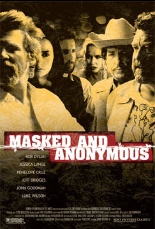
 On an alternate timeline in an alternate America, a civil war with questionable sides rages on as everyday people try to survive by ignoring it. As the despot president begins to face his last few hours of life, the ubiquitous television network decides to hold a rather sketchy benefit concert for either the victims of the war or the promoter’s sizable debts, whichever comes first.
On an alternate timeline in an alternate America, a civil war with questionable sides rages on as everyday people try to survive by ignoring it. As the despot president begins to face his last few hours of life, the ubiquitous television network decides to hold a rather sketchy benefit concert for either the victims of the war or the promoter’s sizable debts, whichever comes first.
To play the show, they spring from prison the troubled troubadour of this timeline, Jack Fate. As he surveys the broken country with a wide array of name-brand actors, dropping abstract mantras and humanistic tantras, things continue to fall apart as Fate and his band perform some death-defying tunes in preparation for the last night of America as they seem to know it.
This remarkably prescient travelogue was conceived by (and starring) Bob Dylan, by the way.
 One of the most woefully ignored films of the past 20 years, Masked and Anonymous is the dystopic present presented as a bitter song of broken hearts, hard-edged and mean-spirited in a way that refuses to give answers or, even worse, reasons for anything that it presents on screen and in theory.
One of the most woefully ignored films of the past 20 years, Masked and Anonymous is the dystopic present presented as a bitter song of broken hearts, hard-edged and mean-spirited in a way that refuses to give answers or, even worse, reasons for anything that it presents on screen and in theory.
And while that is usually something that might irritate most people, here, through Dylan and director Larry Charles’ acidic pen, it all seems like it was just two decades too early. With the threat of wars, pestilence, famine and death riding just over our own horizon, we don’t need to know the hows and whys anymore; we just gotta turn on the TV and figure out a way to survive it.
Dylan as Fate is, ironically, the movie’s Everyman; when he says, “I stopped trying to figure things out long ago,” it’s the only way to make sense of the shit that rolls down from on high, both in the film and in our own damnable lives, guaranteed no tomorrows. —Louis Fowler



 Hunter could be the next-door neighbor to Julianne Moore’s Carol White, the equally disillusioned and oppressed spouse at the center of Todd Haynes’
Hunter could be the next-door neighbor to Julianne Moore’s Carol White, the equally disillusioned and oppressed spouse at the center of Todd Haynes’ 
 Circa 2000, Troma’s
Circa 2000, Troma’s 



 Filmed in a year when Spanish
Filmed in a year when Spanish 